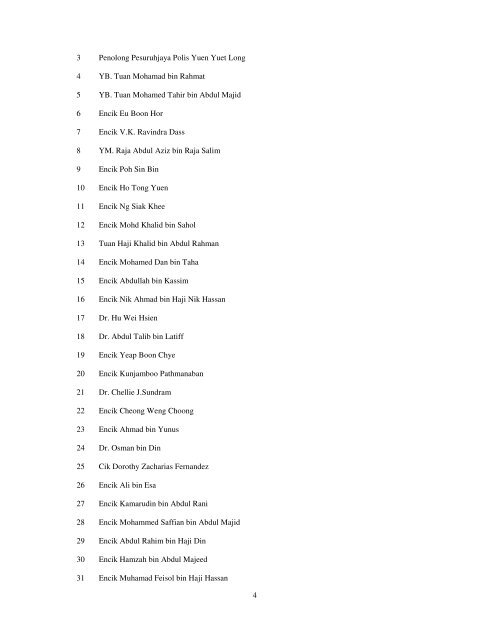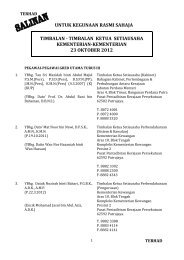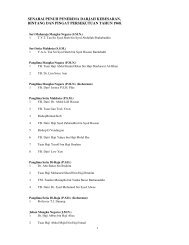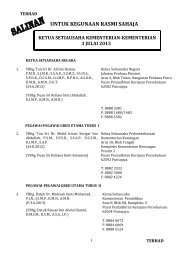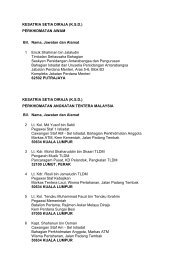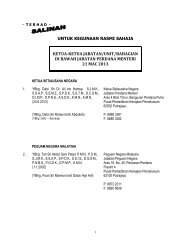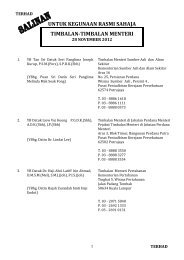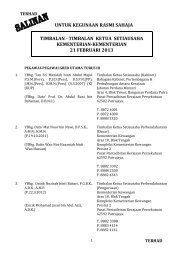Senarai Penerima Darjah Kebesaran, Bintang dan Pingat ...
Senarai Penerima Darjah Kebesaran, Bintang dan Pingat ...
Senarai Penerima Darjah Kebesaran, Bintang dan Pingat ...
You also want an ePaper? Increase the reach of your titles
YUMPU automatically turns print PDFs into web optimized ePapers that Google loves.
Colin W. Maguire__________________________________________________________________Philosophizing writers like Thomas Hobbes, John Locke, and Jean-JacqueRousseau were some of most popular authors of their day. Hobbes, an Englishmen,published his seminal work in 1642: Leviathan. Locke, another Englishmen, wrotemany treaties which were popular in the late 17 th and early 18 th centuries. The mostinfluential of Locke’s works being his Second Treaties on Government. Jean-Jacques Rousseau, a self-proclaimed citizen of Zurich, first published, in French,On the Social Contract in 1762. The subsequently translated book was an immensesuccess in all of Europe and its colonies. These works look at nature and try todecipher how the lessons of the natural world are applicable to society. The spiritof the American Revolution, and resulting governing structures, reflect influencesfrom these works. Each one of these great and influential minds possesses commonthread in their appreciation of nature. An understanding of the importantphilosophical relationship between America’s natural resources and America’sspirit of freedom predates contemporary times and must functionally affectconservative thinking.2. The Importance of Nature in Hobbes’ Body PolitiqueThomas Hobbes subscribed to the theory that he and his contemporaries wereall part of a Body Politique, a single commonwealth that formed the body, soul,and sword of a country, with the monarch as its head. 15 It is this commonwealththat Hobbes termed the “Leviathan” because of the size, power, and structure ofthe society. 16 Hobbes’ work provided the foundation for a political movement thatwas derived from a modern British understanding of political structure. 17 Thefounders of the new American nation borrowed, as much as their beliefs’ wouldallow them, directly from the Hobbesian understanding of equality. 18 Hobbesargued that the Body Politique is a creation of man. Just as God made man in hisimage, so man created the commonwealth that is the Body Politique in his ownimage. Despite the constructed nature of the commonwealth, Hobbes insisted it issubject to the laws of nature. 19Hobbes asserted that the relationship between nature and man wasinseparable and important. To understand how man interacts with nature, Hobbeslooked first at how men interact with one another. Hobbes saw man’s greateststrength as the ability to unite. Through a combination of natural and civil laws,man can create the “Common-wealth”: a powerful association of faction whichman may use to bring peace or war. 20 The base of this powerful entity is that everyman has the power to obtain a future good. 21 In Hobbes’s time, this future goodwas raw materials derived from nature and there would be competition for suchmaterials. Hobbes proposed an approach as to how that would play out.Hobbes gave us a surprisingly liberal definition of the equality of man.Strikingly, it is not equality in the eyes of God but equality in the eyes of nature. 22In the context of nature, Hobbes argued, we equate almost perfectly. 23 Some maybe stronger, faster, or smarter, but these differences are infinitesimal in the context3


